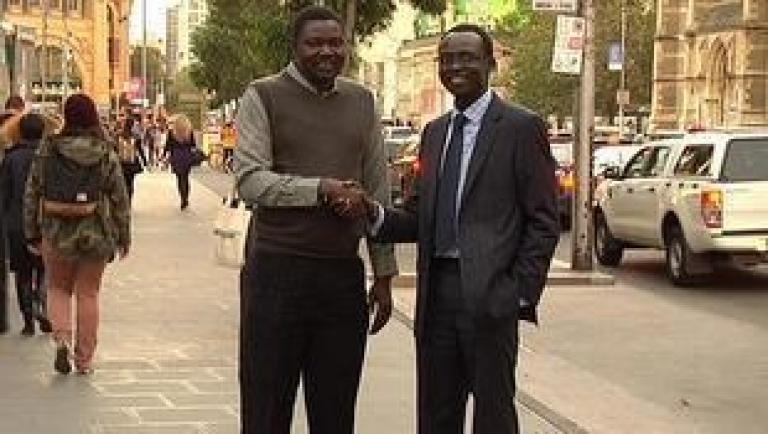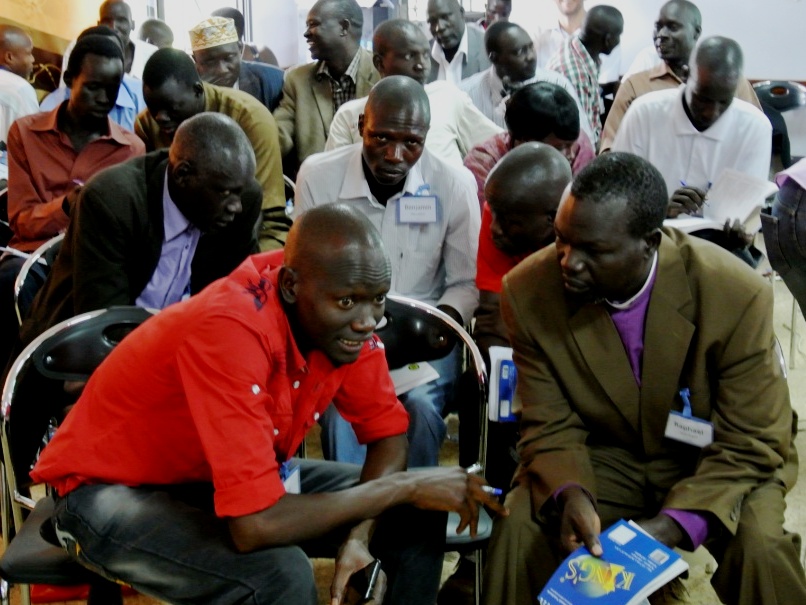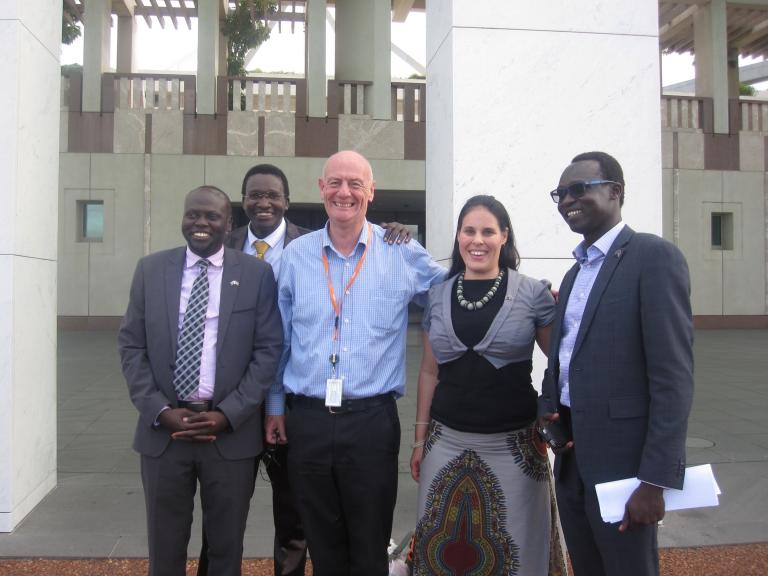Addressing the Roots of the South Sudan Conflict

South Sudan is the world’s newest country, but 72% of its people live in refugee camps. Kathryn Gor describes what the diaspora community in Australia is doing to help.
From Australian shores, the South Sudan conflict can seem so far away, yet for some it is all too close. Over 30,000 South Sudanese people have made Australia their home, and many have immediate family still caught in the conflict.
Nyok Gor is one such person. Fleeing to a refugee camp at the age of eight, pulled into service as a child soldier, and finally receiving school education at a camp in Kenya, he came eventually to live in Melbourne. After becoming involved with Initiatives of Change (IofC) in Australia, Nyok, a Dinka, chose to reconcile with another South Sudanese, Peter Kaka from the Murle tribe, upon finding out they each had family who had been killed in the conflict. With support from friends at IofC, they co-founded the South Sudan – Australia Peace Initiative (SSAPI) with a focus on reconciliation and forgiveness. Out of SSAPI’s activities and influence, a Parliamentary Friendship Group has formed in Canberra, and joint community activities are taking place among Dinka, Nuer and others in Australia.
South Sudan gained independence in July 2011, breaking away from the Arab-dominated north after decades of civil strife. Yet within two short years, the fledgling government imploded amid accusations of a planned coup. A multi-polar conflict spread and many people have fled their homes; around 4 million people are displaced, and 1.5 million are refugees outside South Sudan. Fragile truces have been negotiated and repeatedly broken, most recently in 2015. The harvest this year was meager. Food prices are high, and the country teeters on the brink of a full-scale famine.

Before the truce failed in 2015, SSAPI was partnering with community groups in South Sudan to spread the message of peace at the local level. SSAPI members helped train 200 ‘Peace Mobilisers’ from across the country to work in their own communities, and started a national conversation about reconciliation. In Australia, a South Sudan Australia Parliamentary Friendship Group has formed, co-chaired by Federal MPs, from the Greens, Labor and Liberal, parties which aims to bring greater understanding of the situation in South Sudan within government circles and support the diaspora community in its peace building efforts.
Nyok and his partner Kathryn, an Australian social worker from Melbourne, knew there were others with similar visions for peace scattered across Australia. In May 2017, they organized a national gathering in Melbourne of South Sudan peace advocates. ‘This was the culmination of many months of discussions between South Sudanese Australian groups based in Melbourne, Sydney, Brisbane, Adelaide and Canberra,’ said Kathryn. ‘We worked hard to involve people who have shown commitment to peace building work, and we were able to bring together a dedicated group of 20 like-minded people.’

Nigel Heywood, an IofC volunteer then working at the Australian Red Cross, facilitated the discussions. These took place at IofC’s Asia-Pacific Centre in Melbourne, an early 20th-century Toorak home gifted to the group in 1956 to use as a venue for its peace-building work. Others who joined the group included the Rev. Tim Costello from World Vision Australia and Denise Cauchi of Diaspora Action Australia. ‘The weekend really flowed,’ Kathryn recalled. ‘We established a shared vision and felt that collaboration on future projects would be effective. One possibility is to look at ways that the churches in Australia may be able to support future efforts, given that there are Nuer and Dinka congregations. The group also resolved to trial a people-to-people dialogue among South Sudanese in Australia.’
Such a dialogue would come at a time when the South Sudanese community in Australia is wrestling with political dissent. There is a Sudan People’s Liberation Movement-in-Opposition (SPLMIO) in Australia, which supports former Vice-President Riek Machar, currently under house arrest in South Africa on charges to lead a coup against sitting President Salva Kiir.
Agreeing that the diaspora community is fragmented, Nyok nevertheless expresses hope for the future. ‘If we disagree on 10 things, perhaps there is one thing that we can agree on, in order to speak together as one voice,’ he said. A common theme that emerged out of discussions at Armagh is that trust among the various political groups has been broken, and needs to be restored.
Following the May meeting at Armagh, a South Australian chapter of SSAPI has formed, based on the efforts of several South Sudanese who attended from Adelaide. The group is receiving some support from IofC Australia. The group organized a reconciliation event in Adelaide on 8 July, just before South Sudan’s independence day on 9 July. Facilitated by David Vincent from the Melbourne SSAPI, it discussed what contribution the diaspora can make to trust building among different South Sudanese ethnic groups, both in Australia and in South Sudan.
In June, a group of women linked with Creators of Peace, an IofC program, organized a charity screening of ‘The Baulkham Hills African Ladies Troupe’, a film about surviving sexual violence. The fundraiser made enough for the community to send two containers of much-needed relief supplies to relatives in South Sudan.
Andrew Edward Tchie is a policy and conflict advisor and PhD candidate at the University of Essex, UK. In a blog post in May 2017, he reflected that, ‘Today’s armed opposition is fragmented. There are far too many groups with little or no linkage to any of the main groups…Local and regional players should think more closely about how to empower local churches, civil society and local communities to facilitate locally-owned peace. This could ultimately help foster steps towards forgiveness, reconciliation and peace-building.’
– Delia Paul
-
For more information about what IofC Australia is doing to support the South Sudan diaspora’s peace building efforts, contact kathryn.gor@iofc.org.
You can see read Andrew Edward Tchie’s full blog post on The Conversation, UK: https://theconversation.com/south-sudan-crisis-deepens-as-main-rebel-groups-fragment-and-realign-76240
Nyok Gor Meeting Peter Kaka, Picture: SBS Australia

